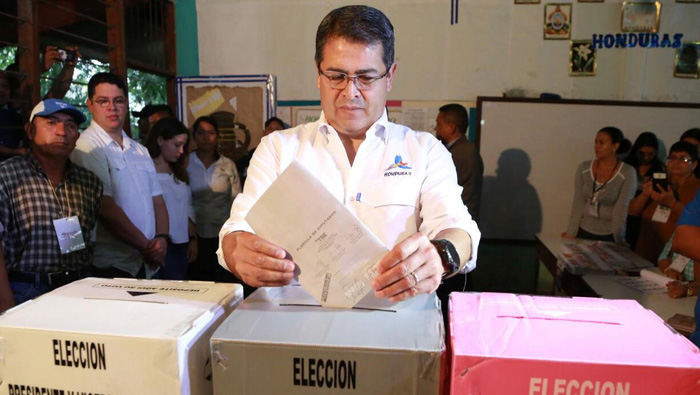
Tegucigalpa: Honduras' U.S.-friendly leader looked poised to win a second term as polling stations opened their doors on Sunday, eight years after he supported a coup to remove a previous president who flirted with reelection.
President Juan Orlando Hernandez, 49, of the center-right National Party, has brought down a sky-high murder rate, accelerated economic growth and cut the deficit since he took office in 2014, and he looks set to profit from a 2015 Supreme Court decision that overturned a constitutional ban on reelection.
But critics warn that Hernandez, a staunch U.S. ally on fighting drug gang and migration, is tightening his grip on power, using a pliant Supreme Court and electoral tribunal to clear a path for his reelection bid in one of the Americas' poorest, most violent countries.
The opposition says the second-term campaign is illegal and that it would not accept results from an election tribunal they accuse of being co-opted by Hernandez until they conduct their own vote count.
Polls suggest Hernandez, born in a humble, rural family of 17 siblings, will benefit from a splintered opposition and savvy political moves to clinch a historic second term and strengthen his militarized assault on gangs. Voters will also elect 128 lawmakers.
In Tegucigalpa, the capital, many are thankful for a lower crime rate and seem willing to overlook Hernandez's consolidation of power, even though he supported the 2009 coup that ousted former president Manuel Zelaya for proposing a referendum on reelection.
Hernandez says he will build roads and bridges with public and private money to lure foreign investment, create 600,000 jobs and help lift economic growth to above 6 per cent.
In second place is sports and talent TV show host Salvador Nasralla, who helms a broad left-right coalition called the Opposition Alliance Against the Dictatorship. It includes the Liberty and Refoundation Party, or LIBRE, which is controlled by Zelaya, whom many see as a force behind the bloc.
Hernandez had a 15-point lead over Nasralla in a September poll, the last allowed under election rules, with 37 per cent of voters expected to back him versus 22 per cent for Nasralla.
As a small group of people stood outside polling stations early on a chilly, overcast morning in the capital, it was apparent that Nasralla also enjoyed a fair amount of support. Klenia Corea, 26, said she and her circle of friends were all voting for him.
"Things are getting worse; we need a change," Corea said, citing a lack of jobs for young people and the president's grip on law enforcement and other tools of power as her main concerns. "He's got all the police," said Corea's mother, Yadira Salgado, 61. "He's got it all tied up." Pundits give Luis Zelaya of the Liberal Party little hope of winning. Instead, the third-ranked candidate, who is not related to the former president, has helped fragment Hernandez's opposition.
Central America has long struggled with leaders from the right and left who have sidestepped or ignored constitutional constraints on power. Should Hernandez win, U.S. officials say they want him to quickly revitalize a stalled bill to cap presidential terms.
"A would-be strongman?" Earl Anthony Wayne, a former U.S. ambassador to Mexico, wrote on Twitter in reference to Hernandez. Honduras has traditionally had close ties with the United States, which viewed the country as an ideological and military partner during the leftist guerrilla insurgencies that roiled the region throughout the Cold War era.
Hernandez has won favour with Washington, working closely on U.S.-bound migration with White House Chief of Staff John Kelly when he was head of U.S. Southern Command and the Department of Homeland Security, and leading a purge of the police force as well as making it easier to extradite drug bosses.
But Hernandez makes for an awkward partner, having faced accusations that drug and graft-stained money has entered his campaigns and criticism that he has stifled dissent. Hernandez's office denies he has financial ties to drug money. Nasralla wants to bring a United Nations-backed investigative body to Honduras to tackle political corruption and organized crime.